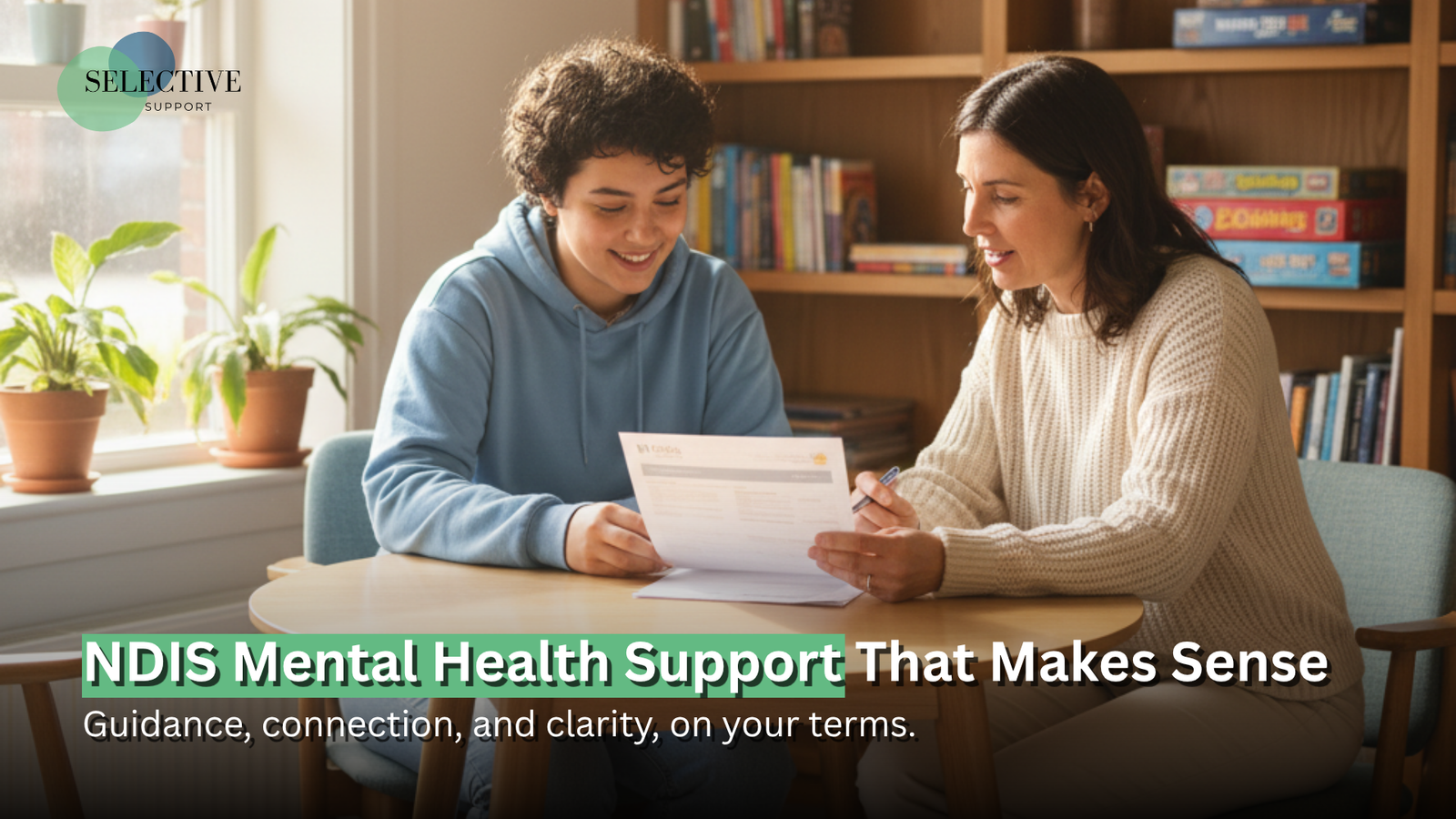NDIS Funding for Mental Health: 3 Services You Can Access
Have you ever stared at your NDIS plan and thought, “I don’t even know what this means for my mental health”? You’re not the only one. In fact, many participants and carers feel stuck or overwhelmed when trying to understand what mental health supports they can actually access.
Here’s the good news: NDIS funding for mental health can open doors to real, meaningful support, if you know what services to look for.
This guide breaks down three key NDIS-funded services that can help you feel more in control, supported, and understood. Whether you’re navigating the system for yourself or supporting a loved one, this post will give you clarity, confidence, and a starting point that feels doable.
1. What Is Support Coordination and How Can It Help?
Ever feel like your plan is just words on paper? That’s where support coordination comes in.
Support Coordination is a service funded by the NDIS to help you understand your plan, connect with the right providers, and build a support network that works for you.
How Support Coordination Uses Your NDIS Funding
Your NDIS plan may include Support Coordination under the Capacity Building category. This means you can be funded to have someone by your side who:
- Explains your plan in plain English
- Helps you find and manage the right services
- Works with you to set and reach personal goals
- Advocates for your needs when things get tricky
For someone like John, who lives with a psychosocial disability and finds provider calls overwhelming, having a trusted support coordinator made a huge difference. It took the pressure off and gave him confidence to move forward at his own pace.
Real-Life Example: How John Found Confidence Through Coordination
John, 28, used to avoid appointments and ignore calls from providers because it all felt too much. When he started working with a support coordinator through Selective Support, things shifted. His coordinator explained everything step by step, helped him get into an art group, and even joined him at his first therapy session. Now, John has routine, a growing sense of confidence, and someone who truly listens.
2. Psychosocial Recovery Coach NDIS: Mental Health Support with Heart
Do you wish you had someone who just “gets it”? In fact, around 62,000 people (about 10 % of all NDIS participants) have a psychosocial primary disability who were active participants in the National Disability Insurance Scheme (NDIS), accounting for approximately 10 % of all participants.
That’s exactly what a Psychosocial Recovery Coach does.
This role is designed specifically for people with a psychosocial disability (a disability arising from mental health issues), and it goes beyond basic coordination.
How Recovery Coaching Supports Your Mental Health Journey
Recovery coaches funded under the NDIS bring lived or learned experience in mental health. They support you to:
- Build resilience and motivation
- Understand and navigate your mental health journey
- Learn practical skills to manage everyday life
- Reconnect with community or activities you enjoy
If you feel like you’re always reacting to crisis and never quite getting on top of things, a recovery coach can help you move from surviving to thriving, on your terms.

Is a Recovery Coach Right for You?
You might benefit from a Psychosocial Recovery Coach if you:
- Have an NDIS plan with psychosocial disability as a primary or secondary condition
- Feel overwhelmed managing your mental health
- Want more personalised support that focuses on building skills, not just managing services
Want someone who understands your journey?
Ask us how to include a Recovery Coach in your next NDIS plan review. Selective Support has caring, local coaches who truly listen.
3. National Disability and Mental Health Services You Can Access
Did you know your NDIS funding can also connect you to a wide range of mental health services, not just coordination?
Through your NDIS plan, you may be eligible to access therapy, wellbeing programs, allied health services and more.
Examples of Mental Health Supports Funded by the NDIS
Here are just some of the services that may be included in your plan:
- Brief therapy and counselling to support short-term challenges
- Psychology or mental health OT for deeper therapeutic support
- Group programs like art, music, or mindfulness sessions
- Community engagement supports to help you reconnect and participate
These services aim to build your capacity, emotional balance, and everyday functioning, and they can be life-changing when tailored to your goals.
Choosing Services That Actually Work for You
Not every service is the right fit. That’s why it helps to work with someone who knows your story and can recommend supports that match your values, goals, and preferences.
At Selective Support, we take the time to:
- Match you with trusted local providers
- Check in regularly to see what’s working
- Adjust supports as your needs change
Looking for the right mental health support in Melbourne?
Our team can help you explore your options and connect you with services that fit your life.
Ready to Feel Supported, Not Stuck?
You deserve more than just a plan on paper. You deserve someone who listens, guides, and walks with you as you navigate your NDIS journey.
Here’s what we covered:
- Support Coordination helps make your plan work in real life.
- Psychosocial Recovery Coaching supports your mental health goals with real understanding.
- NDIS-funded mental health services give you access to therapy, community, and emotional balance.
With the right support, you can move from feeling overwhelmed to feeling confident and connected. And you don’t have to do it alone.
Get in touch today to see how Selective Support can help you make the most of your NDIS funding for mental health.
Frequently Asked Questions About NDIS Mental Health Funding
1. Can I apply for NDIS funding if I only have a mental health condition?
Yes. If your mental health condition causes significant, ongoing functional impacts in your daily life, you may be eligible for NDIS funding under psychosocial disability. A professional assessment and supporting documentation are usually required.
2. What documents do I need to apply for NDIS with a mental health condition?
You’ll typically need a recent mental health diagnosis, reports from treating professionals (like a psychologist or psychiatrist), and evidence showing how your condition affects daily functioning. A GP or support worker can help prepare this.
3. Does the NDIS cover private therapy or psychology sessions?
Yes, the NDIS may fund therapy like psychology, counselling, or occupational therapy, if it relates directly to your disability support needs and is included in your plan.


